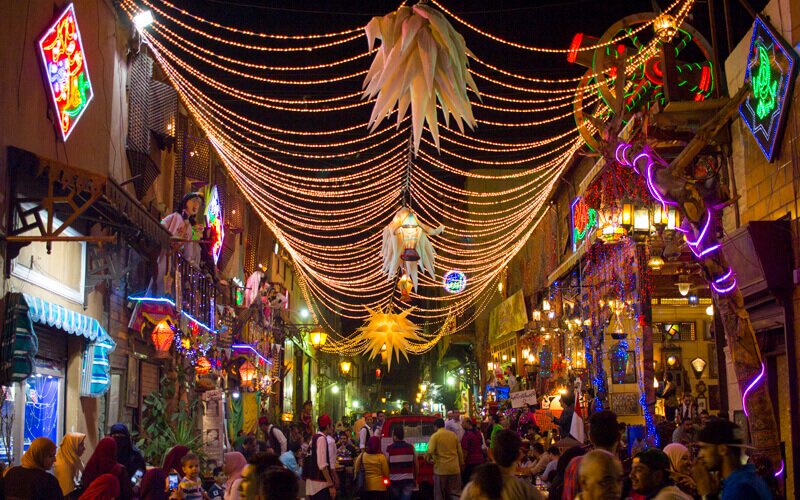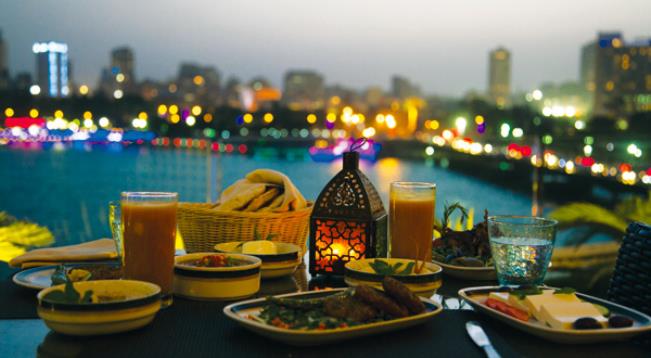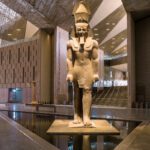Introduction:
Egypt, a country steeped in ancient history and cultural richness, welcomes travelers with open arms throughout the year. However, for those planning a visit during the holy month of Ramadan, a unique and enchanting experience awaits.
Ramadan, the ninth month of the Islamic lunar calendar, is a time of spiritual reflection, fasting, and communal celebrations for Muslims around the world. In Egypt, this sacred month is not only observed with religious fervor but also embraced with distinctive cultural traditions and festivities.
This article serves as a guide for those embarking on a journey to Egypt during Ramadan, offering insights into the customs, practices, and vibrant atmosphere that characterize this period. From the bustling streets adorned with colorful decorations to the aroma of traditional dishes wafting through the air during Iftar, each moment during Ramadan in Egypt is an opportunity to delve into the country’s deep-rooted traditions.
Whether you’re a cultural enthusiast, a history buff, or simply an adventurous traveler, this article will provide essential information and tips to make your Ramadan trip to Egypt an unforgettable and enriching experience. Join us as we explore what to expect when traveling to Egypt during the sacred and joyous month of Ramadan.
Ramadan in Egypt

Ramadan in Egypt: A Tapestry of Spirituality and Celebration
Understanding the Basics of Ramadan:
Ramadan, the holiest month in Islam, holds a special place in the hearts of millions of Egyptians. As a lunar month, its timing varies each year, aligning with the Islamic calendar. At its core, Ramadan symbolizes a period of self-discipline, reflection, and heightened spirituality for Muslims. The fasting ritual, known as “Sawm,” involves abstaining from food, drink, smoking, and certain behaviors from dawn until sunset.
Suhoor and Iftar Traditions:
Two pivotal moments structure the daily routine during Ramadan – Suhoor (pre-dawn meal) and Iftar (breaking of the fast at sunset). Suhoor is a pre-dawn feast, providing the necessary sustenance for the day ahead. Iftar, on the other hand, is a communal affair where families and communities come together to break their fast. The sound of the cannon firing across the city signals the end of the day’s fast, and the streets come alive with joyous celebrations.
Unique Aspects of Ramadan in Egypt:
Decorations and Festive Atmosphere:
The streets of Egypt undergo a magical transformation during Ramadan. Elaborate light displays, colorful lanterns (known as “fawanees”), and vibrant decorations adorn homes, markets, and public spaces. The festive atmosphere creates a sense of unity and joy, bringing people from diverse backgrounds together to celebrate this sacred month.
Special Foods and Drinks During Ramadan:
Egyptian cuisine takes center stage during Ramadan, with a variety of traditional dishes that are unique to this time of the year. From the iconic dates and refreshing drinks like Qamar al-Din to the hearty soups and flavorful pastries, the culinary landscape becomes a testament to the richness of Egyptian gastronomy.
As you navigate through the streets of Egypt during Ramadan, these unique aspects of the holy month will captivate your senses, providing a cultural tapestry that reflects the spirit of unity, generosity, and devotion that defines Ramadan in this enchanting country.
Activities and Events

Activities and Events: Embracing the Vibrancy of Ramadan in Egypt
Nightly Celebrations:
1. Traditional Prayers and Tarawih:
One of the quintessential experiences during Ramadan in Egypt is participating in the nightly prayers, especially the Tarawih. These extended congregational prayers held at mosques bring communities together in profound spiritual unity. The melodious recitation of the Quran and the serene atmosphere create a sense of serenity and connection to the divine.
2. Street Festivities and Markets:
As the sun sets, the streets come alive with vibrant festivities. Markets bustle with activity, offering an array of special Ramadan goods, from traditional sweets to handmade crafts. Live performances, street vendors, and captivating decorations contribute to a lively and communal spirit that defines Ramadan evenings in Egypt.
Tourist-Friendly Iftar Experiences:
1. Trying Local Iftar Buffets:
Egypt’s culinary scene truly shines during Ramadan, with restaurants and hotels offering lavish Iftar buffets. From traditional dishes to international cuisine, these buffets provide a unique opportunity to savor the diversity of Egyptian food. Popular tourist destinations often host special Iftar events, allowing visitors to partake in the communal breaking of the fast.
2. Participating in Communal Iftar Events:
For a more immersive experience, consider joining communal Iftar events organized by local communities or charitable organizations. These gatherings exemplify the spirit of generosity and inclusivity, where people from all walks of life come together to share a meal, fostering a sense of unity and understanding.
Exploring these activities and events will not only enrich your travel experience but also allow you to witness firsthand the cultural and spiritual significance that permeates every corner of Egypt during the sacred month of Ramadan. From the tranquility of the mosque prayers to the vibrant energy of the bustling markets, each moment contributes to the tapestry of Ramadan in this captivating country.
Adjusting Your Schedule
Adjusting Your Schedule: Navigating Egypt’s Unique Rhythms During Ramadan
Choosing the Right Dates:
1. Understanding the Lunar Calendar:
Ramadan’s timing is determined by the lunar calendar, making it crucial for travelers to be aware of the specific dates each year. The Islamic calendar is shorter than the Gregorian calendar, causing Ramadan to shift annually. Checking reliable sources for the lunar calendar will help you plan your trip accordingly.
2. Checking Ramadan Dates for the Specific Year:
Stay updated on the start and end dates of Ramadan for the year of your visit. This information is vital for planning activities, as the atmosphere and routines in Egypt undergo significant changes during this sacred month. Flexibility in your travel dates can enhance your overall experience.
Cultural Sensitivity:
1. Respecting Local Customs:
During Ramadan, cultural sensitivity plays a crucial role in ensuring a positive and respectful interaction with the local community. Understanding and adhering to the customs, such as refraining from eating or drinking in public during fasting hours, showcases a deep appreciation for the significance of the month.
2. Dress Code and Modesty During Ramadan:
Egyptians typically dress modestly, and this practice becomes even more pronounced during Ramadan. Visitors are encouraged to adopt conservative clothing, especially when visiting religious sites or attending Iftar events. This cultural sensitivity fosters mutual respect and creates a more immersive travel experience.
Navigating Changes in Daily Routines:
1. Opening Hours of Businesses and Attractions:
Throughout Ramadan, the operating hours of businesses and tourist attractions may be adjusted. Many establishments close during the day and reopen in the evening, aligning with the Iftar festivities. Plan your activities accordingly, and be aware of any potential disruptions to your daily itinerary.
2. Transportation Considerations:
Public transportation schedules, including buses and trains, may undergo alterations during Ramadan. It’s essential to check and plan your journeys accordingly, considering potential delays and adjustments to accommodate the daily fasting routines of locals.
Navigating Public Spaces During Iftar:
1. Respecting the Breaking of the Fast:
As the call to prayer signals the end of the daily fast, known as Maghrib, it’s customary for Muslims to break their fast immediately. During this time, streets and public spaces may become congested as people rush to join communal Iftar events. Be mindful of the heightened activity and avoid creating obstructions in these areas.
2. Being Mindful of Prayer Times:
Understanding the five daily prayer times is essential during Ramadan. These times significantly impact local routines, including business operations and public activities. Familiarize yourself with the prayer schedule and plan your outings to align with the cultural practices of the community.
Adjusting your schedule to the unique rhythms of Egypt during Ramadan not only ensures a smoother travel experience but also allows you to appreciate and participate in the cultural richness that defines this sacred month in the country. By embracing the changes in daily life, you’ll find yourself immersed in the authentic and transformative atmosphere that Ramadan brings to Egypt.
Tips for a Fulfilling Experience

Tips for a Fulfilling Ramadan Experience in Egypt: Embracing Culture and Connection
Engaging with Locals:
1. Learning Basic Arabic Greetings:
A simple “As-salamu alaykum” (peace be upon you) can go a long way in connecting with locals during Ramadan. Learning a few basic Arabic greetings not only demonstrates respect for the culture but also fosters a warm and welcoming atmosphere.
2. Participating in Community Events:
Take the opportunity to join communal events and activities organized by local communities. Whether it’s joining in a street celebration, attending a mosque event, or sharing an Iftar meal with locals, actively participating in community gatherings provides a deeper understanding of the cultural significance of Ramadan.
Embracing the Cultural Richness:
1. Visiting Historical and Religious Sites:
Explore the historical and religious sites that Egypt is renowned for, but with a unique Ramadan twist. Many mosques and landmarks may be beautifully illuminated during this time, offering a breathtaking and spiritually charged atmosphere. Consider visiting places like the historic Al-Hussein Mosque in Cairo or the majestic Sultan Hassan Mosque.
2. Exploring the Significance of Ramadan Art and Decorations:
Take a leisurely stroll through neighborhoods adorned with Ramadan decorations. The intricate designs, vibrant colors, and illuminated fawanees (lanterns) create an enchanting ambiance. Engage with locals to learn about the symbolism behind these decorations, gaining a deeper appreciation for the cultural expressions of Ramadan.
Adapting to the Daily Routine:
1. Respecting Prayer Times:
Be mindful of the five daily prayer times and the impact they have on local routines. Plan your activities around these times, allowing yourself to experience the genuine devotion and spirituality that characterizes the month of Ramadan.
2. Embracing Changes in Culinary Practices:
Indulge in the diverse and delectable offerings of Egyptian cuisine during Ramadan. Venture beyond the traditional dishes available year-round and savor the unique Iftar delights. Engaging in the culinary traditions of Ramadan enhances your cultural experience and fosters a sense of connection with the local community.
By incorporating these tips into your travel plans, you can transform your journey to Egypt during Ramadan into a profoundly enriching and fulfilling experience. From connecting with locals through language and community events to immersing yourself in the cultural tapestry of Ramadan, these tips will guide you towards a more authentic and meaningful exploration of this sacred month in the heart of Egypt.
Conclusion
Conclusion: Embracing the Spirit of Ramadan in Egypt
As your journey through Egypt during the sacred month of Ramadan unfolds, you find yourself immersed in a tapestry of cultural richness, spirituality, and community. The unique experiences encountered, from the dazzling decorations adorning the streets to the soul-stirring Tarawih prayers echoing through mosques, contribute to the enchanting atmosphere that defines Ramadan in this captivating country.
Adjusting your schedule to align with the rhythms of daily life during Ramadan becomes not just a logistical necessity but a gateway to a more profound connection with the local culture. From respecting prayer times to adapting to changes in culinary practices, each adjustment opens doors to a more authentic and immersive travel experience.
Engaging with locals proves to be a key element in unlocking the true essence of Ramadan in Egypt. Learning basic Arabic greetings and participating in community events create bridges of understanding, fostering connections that transcend cultural boundaries. The vibrant atmosphere of nightly celebrations and the warmth of communal Iftar events offer not only a taste of local traditions but also a glimpse into the generosity and unity that define Ramadan.
Exploring historical and religious sites during this holy month adds an extra layer of significance to your journey. The illuminated landmarks and the cultural expressions through art and decorations provide a visual feast that complements the spiritual ambiance surrounding Ramadan in Egypt.
In the heart of this cultural tapestry, you discover that your journey is not just about sightseeing; it’s about embracing the values, traditions, and connections that make Ramadan in Egypt a truly fulfilling experience. From the bustling markets to the tranquil moments of prayer, every step is an opportunity to appreciate the beauty of this sacred month and the warmth of Egyptian hospitality.
As you bid farewell to Egypt, you carry with you not just memories of historic sites and culinary delights but a deeper understanding of the cultural significance of Ramadan. Your journey becomes a testament to the power of travel to transform, educate, and unite people across diverse backgrounds. May your experience in Egypt during Ramadan be a source of inspiration, fostering a spirit of cultural appreciation that transcends borders and lasts a lifetime.




Leave a Reply